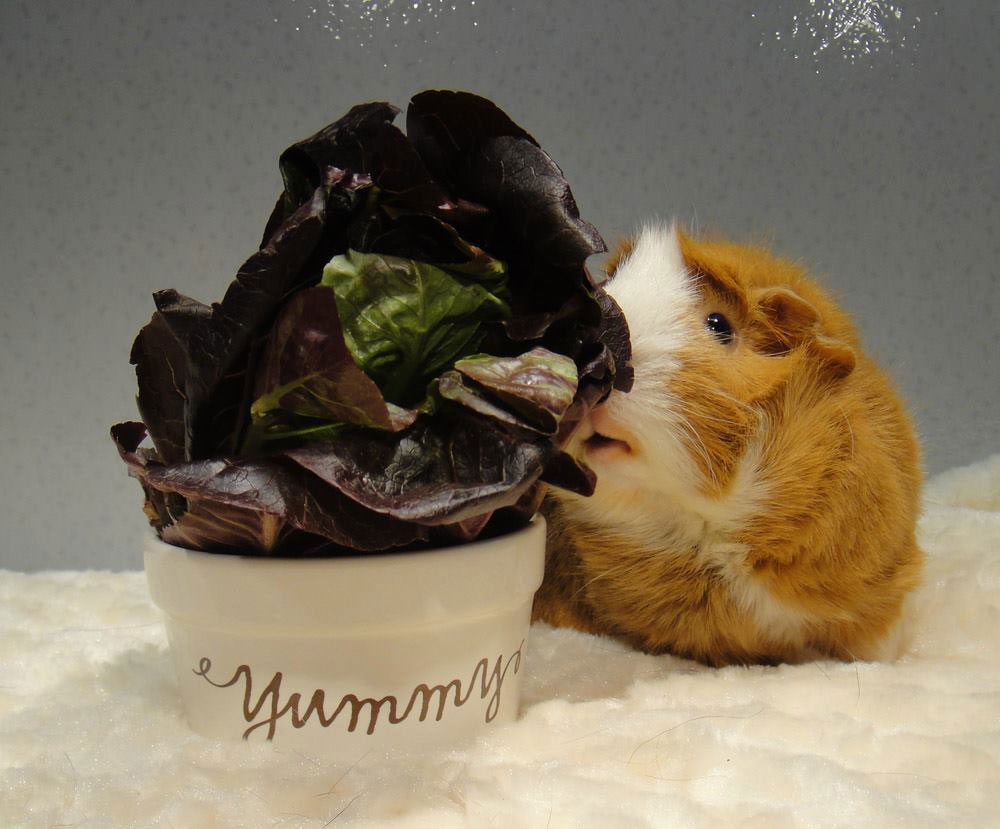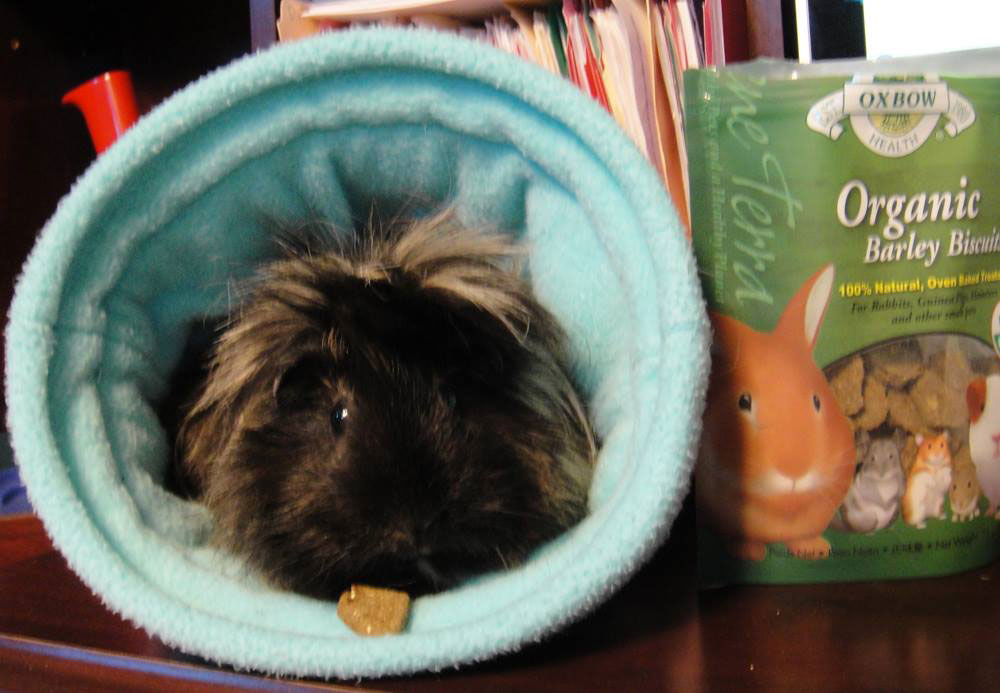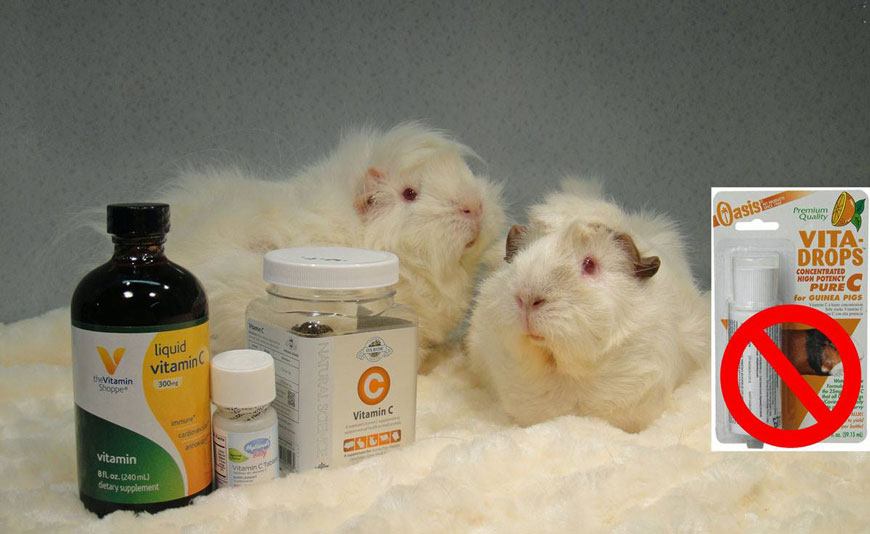Absolutely NO Chocolate (Poisonous!!!), cookies, crackers, breakfast cereals, bread, pasta, yogurt drops or other "human treats." There is research to suggest these items may contribute to fatal cases of enterotoxaemia, a toxic overgrowth of "bad" bacteria in the intestinal tract.
Vegetables are an essential part of guinea pigs' diet. Try to feed 3 VEGETABLE SERVINGS PER DAY. BE SURE ONE IS SOME TYPE OF LEAFY GREEN. Please, no more than 1 serving of any given vegetable in a day!!
Fruit is considered a treat. Provide fruit sparingly - no more than ONCE OR TWICE A WEEK.
Click to learn more about providing vegetables and fruits.
Provide a variety of vegetables. A variety is necessary in order to obtain the necessary nutrients, with one each day that contains Vitamin A. Add one vegetable to the diet at a time. Eliminate if it causes soft stools or diarrhea.
This is a handy reference of veggies and fruits that guinea pigs can eat:
The following vegetables may be provided:
(!)=Use no more than twice a week. High in either oxalates or goitrogens
and may be toxic in accumulated quantities over a period of time.
(*)=Use no more than twice a week.
Limit fruits to 1-2 tablespoons per 2 lbs. of body weight (none if dieting) from the list below of high fiber fruits. USE FRUIT ONLY ONCE OR TWICE A WEEK. Sugary fruits such as bananas and grapes should be used only sparingly. Guineas have a sweet tooth and if left to their own devices will devour sugary foods to the exclusion of healthful ones.
1 cubic inch of the following fruits may be provided but no more than once or twice a week:

Guinea pigs require grass hay. Grass hay must be made available at all times to keep your guinea pigs healthy. Grass hay provides the fiber guinea pigs need for digestion and helps grind their constantly growing teeth. Without grass hay, guinea pigs teeth may become too long, which may hinder eating and cause other problems.
What kind of hay to provide?
Alfalfa contains a large amount of calcium. A diet containing a large amount of calcium can cause stones to form in a guinea pig. Stones are painful and often require surgery to remove.
To reduce the likelihood of a stone forming, guinea pigs should be provided with unlimited mixed grass (e.g., orchard grass or bluegrass) or timothy hay. Alfalfa hay
may be provided in addition to mixed grass to pregnant or nursing guinea pigs, who need the extra calcium for the development of their pups, or to guinea pigs younger than 6 months, who need the extra calcium for development.
Check with your exotic vet if you have a pregnant, nursing, or very young guinea pig on proper nutrition.
Where to buy hay?
There are many places where you can buy orchard grass or timothy and a few where you can buy bluegrass. These are just a few places online where you can buy directly from local farms.
Look for 2nd cut. 1st cut has too many stems and is too hard for guinea pigs.
Allergies?
Grass hay (timothy hay or orchard grass) must be available to guinea pigs at all times in non-compressed form (compressed
hay cakes sold by Oxbow are an ok treat). Please make sure that you don't have allergies that would interfere with providing grass hay and/or keeping the guinea pig before adopting.
If you are unsure whether you have allergies to grass hay, buy a bag of grass hay (timothy or orchard grass) and keep it open in your home to test for any reaction. Those with allergies sometimes find that
a home air filter reduces their reaction.
Guinea pigs should be given a pellet based food - about 1/8 cup per guinea pig per day (for pregnant, nursing, or guinea pigs 6 months or less, pellets should be available at all times even if this means feeding more than 1/8 cup per day). Guinea pigs 6 months or less (or pregnant or nursing) may be fed pellets with some alfalfa. Guinea pigs over 6 months should be fed timothy pellets. Pellets containing alfalfa contain a large of calcium (alfalfa is calcium-rich). Guinea pigs 6 months or less need the extra calcium for development; guinea pigs over 6 months don't. A diet containing a large amount of calcium can cause stones to form in a guinea pig. Stones are painful and often require surgery to remove. Guinea pigs over 6 months, therefore, should be fed timothy pellets to reduce the likelihood of a stone forming.
Pellets fed to guinea pigs of any age should be free from "junk" like nuts, seeds, etc., which cause obesity and pose a choking hazard.
The following is a list of quality pellets.

Pet stores sell many treats for guinea pigs. The honey sticks, seed sticks, yogurt drops, gummy vitamin C chews, and other sweet treats sold at pet stores aren't good for guinea pigs. They contain too much sugar and too many calories. Don't provide them. If you want to provide a treat, any of the Oxbow Simple Rewards are fine when provided in moderation. Oxbow Simple Rewards contain no added sugar or fattening ingredients like seeds and nuts.

Wheat grass can be given as a treat and you can grow your own even in a small apartment.
Vitamin C is important to the health of guinea pigs. Guinea pigs unfortunately do not make their own vitamin C and rely on getting it from their diet. The pellets, vegetables, and fruits guinea pigs consume contain vitamin C. It is a good idea to provide guinea pigs with supplemental vitamin C, especially older guinea pigs who often don't absorb nutrients as well and sick guinea pigs who need the vitamin C for recovery.
Vitamin C supplements:
Don't provide:

Copyright © 2011 - All Rights Reserved - Metropolitan Guinea Pig Rescue
Template by OS Templates